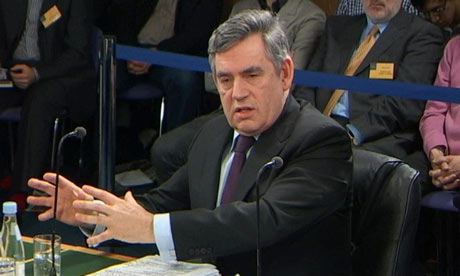Here was a prime minister in pre-election mode, hiding behind the convention of collective cabinet responsibility Gordon Brown addressing the Chilcot inquiry into the war on Iraq. Photograph: Reuters TV/Reuters "The right decision for the right reasons." Gordon Brown's mantra at the Iraq inquiry today was the perfect way of backing the decision to go to war while distancing himself from it. He claimed to have been in the loop all the way through, although the evidence suggests that he wasn't. So that's his alibi: if the war was "really" for different reasons from Tony Blair's stated justification, Brown didn't know this and – apparently – still doesn't realise today. It is easy to see why Sir John Chilcot would have preferred to have Brown appear after the coming election. The needs of his inquiry have collided with Brown's need to give no ammunition to his opponents. Brown delivered a very political performance, full of mantras, soundbites and not answering the question. The prime minister had already made clear that he would not tell the truth. A couple of weeks back, he told the Independent on Sunday that he would assert his backing for the war on the basis of Saddam Hussein's "breach of international obligations" but also that he would set out this position on the basis that "You accept the collective responsibility of the cabinet ... When a decision's made you've got to stand by it." The convention of collective cabinet responsibility, which requires cabinet ministers to back policies that they do not agree with, is not just a licence to lie, but a requirement to do so. So Brown signalled in advance that he would today have his fingers crossed behind his back. When he said that he was as informed as he needed to be all the way through in an overt statement of loyalty to Blair, it was – from the inquiry's point of view – quite meaningless. He was doing what was required of him politically. But the questioning made clear that Brown was really out of the loop, although he may well have known what was really going on from his own sources. Brown did not see the key Cabinet Office options paper of March 2002, was not involved in discussions before Tony Blair visited George Bush in Crawford that April, did not attend the key meeting of 23 July 2002 and did not know what commitments Blair was making to Bush all the way through. And crucially, as Sir Roderic Lyne skilfully pointed out, Brown was not aware that the French government tried very hard to tell the British government that it was misrepresenting or misinterpreting President Jacques Chirac in claiming that France would not support any new resolution that gave authorisation for war. "I was not foreign secretary," Brown said, in what might be seen as an implicit criticism of the man who was foreign secretary, Jack Straw. This is where Brown's argument, that he backed the war to protect the ability of the international community to take action, falls down. He claimed rather weakly that Saddam Hussein refused to comply with disclosure and disarmament requirements, even though Iraq was complying at the time of the war. He apparently felt on stronger ground in claiming that the ability to achieve a diplomatic solution ended when some countries – eventually he admitted it was France – would not agree to authorise military action. If that counter-intuitive claim was not in any case true, Brown was misled. But didn't Clare Short tell the inquiry that this was a lie in which Blair, Brown and Alastair Campbell were all complicit? Lyne put it to him that in fact what Blair had said publicly and to the inquiry implied that the British government had aligned with the US policy of regime change "under pressure of the American military deadline". Brown had no answer to this. He also admitted that he had not known that attorney general Lord Goldsmith had given an equivocal view of the legality of the war just two weeks before it began and had before that thought it would be illegal. Brown said though that nothing short of Goldsmith saying to the cabinet that the war would be illegal would have made him change his mind. But then he would say that, because collective cabinet responsibility required him to back the decision. On the issue of the intelligence, Lyne put it to Brown that Robin Cook had said publicly before the war that the intelligence on Iraq's WMD was unconvincing. Again, Brown had no answer to this but claimed, falsely, that the doubts over the intelligence case arose only after the war. Another mantra that Brown repeated was that the government's policy all the way through was to achieve a diplomatic solution to the issue of Iraq's alleged weapons. Effectively he was saying that if this was not the case, as Short now believes, it was Blair who had misled him. It was fundamentally a political performance. Brown was in the mode that he adopts in the political arena – saying the same thing over again, running through a series of facts, figures and assertions at great speed, and avoiding the question. Like Blair and many of the government's witnesses, he failed over and over again to answer a straight question. He ducked all questions about whether he agreed with Blair about links between Iraq and terrorism, that Iraq was a real and present danger and that the threat from its weapons was "growing". True to his policy of maintaining collective cabinet responsibility, he would not even admit directly that cabinet government had not worked effectively in the run up to the war, saying only that "lessons had been learned", via the Butler review. Most significantly, he refused to engage with Lady Prashar's question about when he found out that the UK would support the US invasion. Underlying this question, like many of those posed by the inquiry to a variety of witnesses, is what Chilcot referred to last month as unpublished evidence of "what really went on behind the scenes before, during and after the Iraq conflict". From a political point of view, Brown will probably be pleased with the way the day turned out. In terms of the most toxic issues, he insisted that he had met every request from the military for additional funding. He also revealed that from as early as June 2002 he said that he was prepared to fund military action – if it came to it – and that he had stressed that cost considerations should not affect which military option was chosen. From the point of view of the inquiry and its eventual verdict, the outcome less clear. Blair and others in his inner circle, who have continued to insist that the war was both right and undertaken for the reasons he stated, run the risk of a pasting from the Chilcot panel, who have seen the papers and know what really went on. But Brown has constructed his alibi. By asserting that he still believes in both the validity and integrity of Blair's policy, he has prepared his fallback position – that he was as much misled as the rest of us.Brown dodges Chilcot's questions

Friday, 5 March 2010
Posted by
Britannia Radio
at
20:51
![]()






















